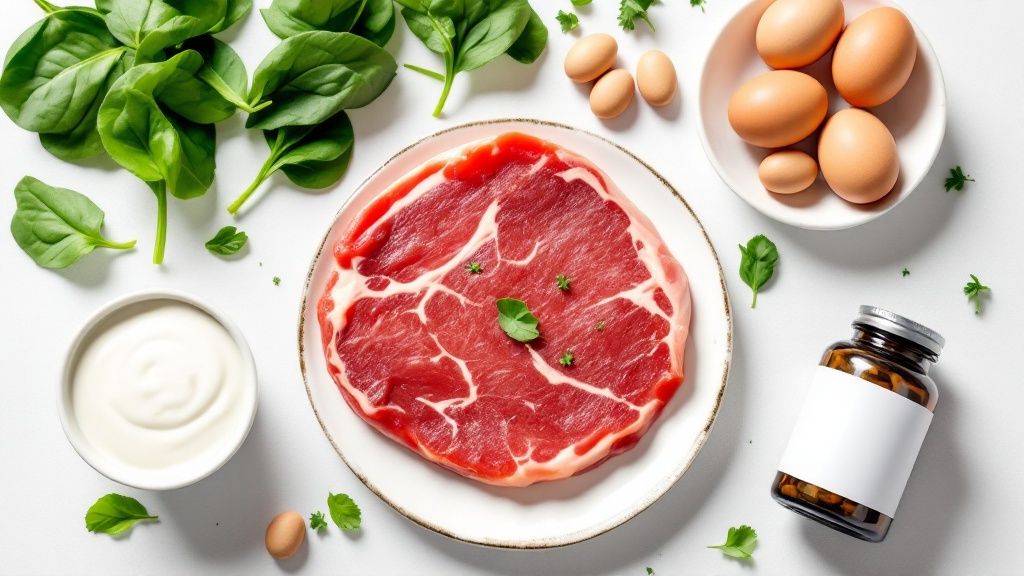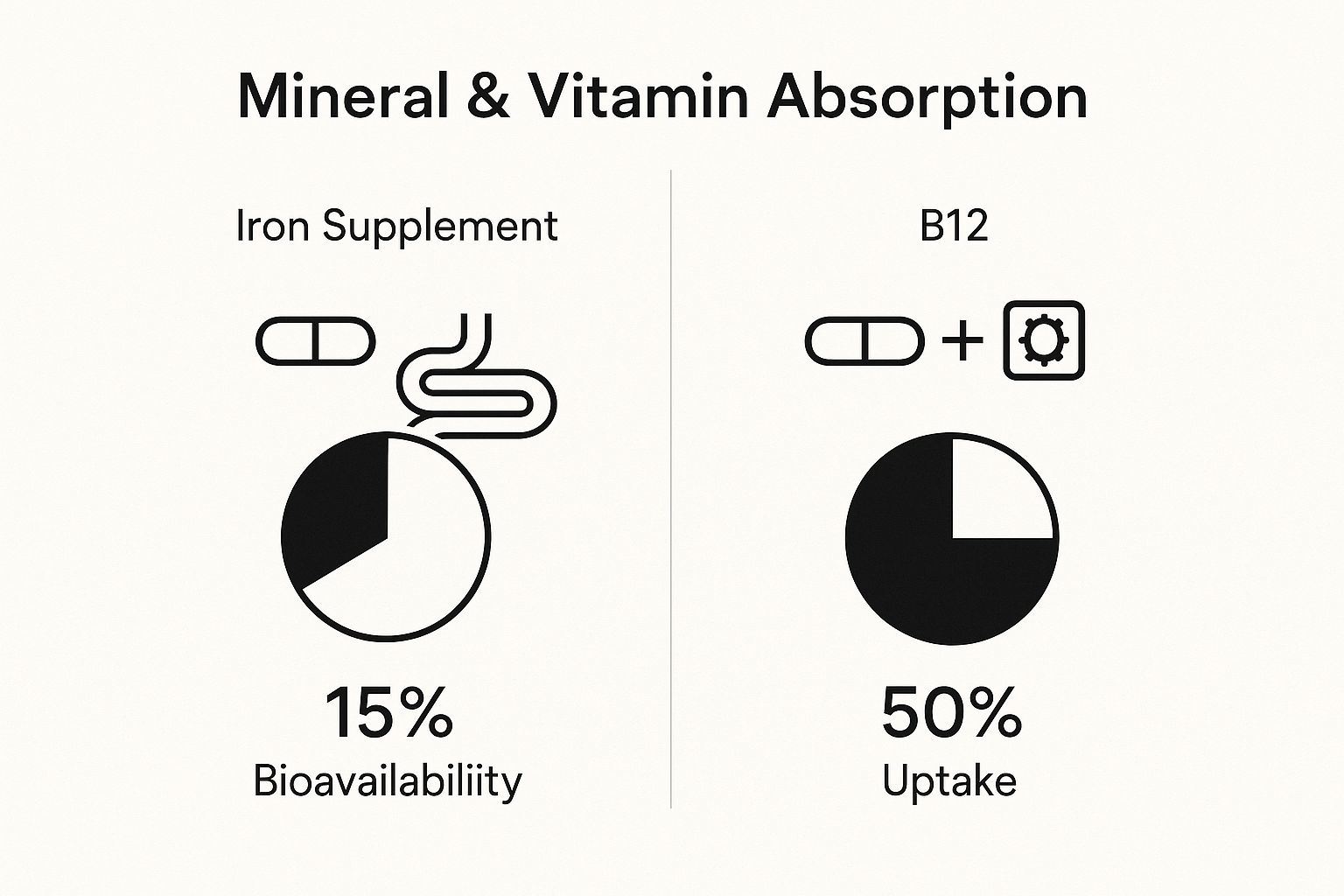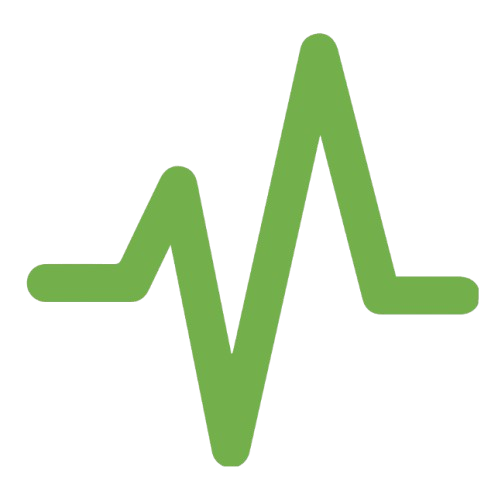
Your Guide to Iron and B12 Supplement Use
Share
An iron and B12 supplement brings together two crucial micronutrients that are absolute workhorses for your body’s energy levels and the production of healthy red blood cells. It’s a common pairing for a very good reason: both nutrients work in tandem to fight fatigue and support your overall vitality, making them a go-to for anyone with specific dietary needs or known deficiencies.
Understanding Your Body's Energy Engine
Picture your body as a high-performance engine. To run at its best, it needs two things: quality fuel and a perfectly timed spark. In this case, think of iron as the fuel and vitamin B12 as the spark. You absolutely need both, but they do very different—yet complementary—jobs to keep you feeling on top of your game.
Iron is a mineral that forms the very core of haemoglobin, which is the protein tucked inside your red blood cells. Its main job? To grab oxygen from your lungs and deliver it to every single cell in your body. If you don't have enough iron, your cells are essentially starved of oxygen, which is why a deficiency can leave you feeling completely exhausted and weak.
Vitamin B12, on the other hand, is the spark that makes sure the engine parts are built correctly in the first place. It’s essential for creating healthy, properly-shaped red blood cells and is also a key player in keeping your entire nervous system running smoothly. You can dive deeper into its benefits in our guide on what the vitamin B complex is good for.
To help you see the differences at a glance, here’s a quick breakdown:
Iron vs. Vitamin B12 at a Glance
| Nutrient | Primary Role in the Body | Common Signs of Deficiency |
|---|---|---|
| Iron | Forms haemoglobin to transport oxygen to cells and tissues. | Extreme fatigue, weakness, pale skin, shortness of breath, cold hands and feet. |
| Vitamin B12 | Essential for the formation of healthy red blood cells and maintaining nerve health. | Tiredness, lethargy, pins and needles, sore tongue, brain fog, vision problems. |
As you can see, while their roles are distinct, the symptoms of a shortfall can often overlap, which is why they are so often discussed together.
The Power of Partnership
When you're running low on either of these nutrients, your whole system can start to feel like it’s grinding to a halt. A shortage in one or the other can leave you feeling drained, unable to focus, and stuck in a mental fog. This is exactly why an iron and B12 supplement can be so effective—it tackles energy production from two different, but deeply interconnected, angles.
- Iron loads up the oxygen carriers: It makes sure the "delivery trucks" (your red blood cells) are fully stocked with oxygen.
- B12 builds healthy carriers: It ensures those delivery trucks are well-made and capable of doing their job properly.
This synergistic relationship is fundamental to how your body produces and uses energy.
In the UK, iron deficiency is a pretty big deal. The NHS estimates that around 10% of women of childbearing age suffer from iron deficiency anaemia, a condition that often makes supplementation a necessary step.
Ultimately, getting your head around how these two micronutrients work together is the first step in figuring out whether this powerhouse duo could be the right addition to your wellness routine.
Who Might Need to Supplement with Iron and B12?

Let's be clear: not everyone needs to be taking an iron and B12 supplement. But for some of us, certain lifestyles and life stages can seriously increase the risk of coming up short. The first step is figuring out if you fall into one of these groups. Think of it as knowing the unique demands of your personal energy engine.
If you’re on a plant-based diet, for example, your risk profile changes straight away. Vitamin B12 is found almost exclusively in animal products like meat, fish, eggs, and dairy. This means for vegetarians, and especially vegans, getting enough from diet alone is a real challenge without relying on fortified foods or reaching for a supplement.
It's a similar story with iron. The type of iron you get from plants (non-haem iron) is simply harder for our bodies to absorb compared to the iron from animal sources (haem iron). This double whammy puts plant-based eaters in a high-risk category for deficiencies in both of these crucial nutrients.
Life Stages and Biological Demands
Your body's need for iron and B12 isn't a flat line; it rises and falls depending on your age, gender, and what's happening in your life. Some groups just naturally have higher requirements.
-
Menstruating and Pregnant Women: It's simple biology. Losing blood during menstruation depletes iron stores, which means you need more to keep your levels topped up. During pregnancy, a woman’s blood volume expands massively to support her growing baby, pushing iron demands to a point where diet alone often can't keep up.
-
Older Adults: As we get older, our bodies just aren't as efficient at absorbing nutrients. The production of stomach acid, which is essential for unlocking B12 from our food, often declines with age. This makes older adults particularly vulnerable to B12 shortfalls, even if they’re eating a perfectly good diet.
Vitamin B12 deficiency is a growing concern in the United Kingdom, particularly among older adults and those on plant-based diets. Research suggests that around 6% of adults over 60 may have an undiagnosed deficiency, which can have a real impact on neurological function. You can learn more about UK dietary supplement trends on grandviewresearch.com.
The Gut Health Connection
Finally, we can't talk about nutrients without talking about gut health. It doesn't matter how much iron and B12 you're getting in your diet if your body can't actually absorb it.
Conditions that affect the digestive system, like coeliac disease, Crohn's disease, or atrophic gastritis, can damage the lining of your gut. This damage gets in the way of your body’s ability to pull these vital nutrients from your food, leading to a deficiency even when your intake seems fine.
Recognising these risk factors is key to making an informed decision about whether an iron and b12 supplement should be part of your wellness plan.
The Real Benefits of Taking Iron and B12 Together

When iron and vitamin B12 team up, their combined impact is far greater than the sum of their parts. Taking an iron and B12 supplement together tackles energy production from two critical angles, leading to tangible benefits you can actually feel day-to-day. It’s not just about correcting a number on a blood test; it's about getting your vitality back.
Think of it like building a house. B12 is the architect and the construction crew, responsible for creating well-formed, healthy red blood cells. Iron, on the other hand, is the essential building material—the bricks and mortar—needed to make haemoglobin, which lets those cells do their job. Without one, the other simply can't function effectively.
This powerful synergy is why so many people notice such a significant difference when supplementing with both. The result? A much more efficient oxygen delivery system for your entire body, which translates directly into noticeable health improvements.
Restored Energy and Stamina
One of the first and most profound benefits people report is a real boost in energy. When your cells finally start getting the oxygen they've been crying out for, that constant feeling of being drained and sluggish begins to lift.
This isn't a temporary jolt like you get from caffeine. It's a fundamental restoration of your body's ability to produce energy. Everyday tasks that once felt like a struggle, from climbing the stairs to getting through a workout, become easier as your physical stamina returns.
An integrated approach to supplementation ensures your body isn't just making more red blood cells, but that those cells are healthy and fully equipped to transport oxygen. This comprehensive support is key to fighting fatigue at its root cause.
Sharper Mental Clarity and Focus
Ever feel like you're walking around in a mental haze? That persistent brain fog is a classic symptom of both iron and B12 deficiencies. It can make it incredibly difficult to concentrate, remember details, or even think clearly. When your brain is starved of oxygen, its performance naturally suffers.
By improving oxygen flow to the brain, a combined iron and B12 supplement can help cut through that fog. Many users report a welcome boost in cognitive function, including:
- Improved Concentration: The ability to focus on tasks for longer without feeling mentally drained.
- Better Memory Recall: Finding it easier to access information and remember important details.
- Quicker Thinking: A feeling of mental sharpness and less sluggishness in your thought processes.
A More Robust Immune System
Beyond energy and focus, iron and B12 are also absolutely vital for maintaining a strong immune system. Both nutrients play a crucial role in producing and maturing your immune cells—your body's first line of defence against pathogens.
A deficiency in either can weaken your immune response, leaving you more susceptible to picking up every bug going around. Ensuring you have adequate levels helps keep your natural defences strong and ready to act, contributing to your overall health and well-being all year round.
How to Choose the Right Supplement for You
Walking into the supplement aisle can feel like a bit of a minefield, with countless bottles all making similar promises. To make a smart choice, you need to know what you're looking for on the labels, because what truly matters is the form of the nutrients inside.
Your body’s ability to actually absorb and use a nutrient all comes down to its chemical form. Think of it like a key and a lock—some keys (the nutrient forms) just fit the lock (your body’s receptors) much better than others. When it comes to iron and B12, picking a highly bioavailable form can make a world of difference, especially if you've got a sensitive stomach.
This image shows just how differently iron and B12 are absorbed in your gut, which really highlights why the form and other factors are so crucial.

The main takeaway? B12 absorption needs a special protein called intrinsic factor and happens in a totally different part of the gut to iron. It just goes to show how complex it is to get these two vital nutrients into your system effectively.
Comparing Common Forms of Iron and B12
Not all supplements are created equal, and the specific form of iron or B12 used can dramatically impact how well it works and how you feel. To help you cut through the confusion, we've broken down the most common forms you'll find on the shelf. This table will help you compare them side-by-side so you can pick the one that’s right for your body.
| Nutrient Form | Key Feature | Best For | Potential Considerations |
|---|---|---|---|
| Iron Bisglycinate | Chelated form (bound to amino acids) often called "gentle iron". | People with sensitive stomachs or who experience constipation with other iron forms. | Can be slightly more expensive than other forms, but often worth it for the comfort. |
| Ferrous Sulphate | A common, low-cost form of iron. | Budget-conscious buyers without digestive sensitivities. | Notoriously hard on the gut; can cause nausea, constipation, and stomach cramps. |
| Methylcobalamin (B12) | The active, bioavailable form of B12. | Almost everyone, as the body can use it immediately without conversion. | Considered the superior form for direct supplementation. |
| Cyanocobalamin (B12) | A synthetic, stable form of B12. | Fortified foods and general multivitamins where stability is key. | The body must convert it to an active form, which can be inefficient for some people. |
Ultimately, choosing a supplement with iron bisglycinate and methylcobalamin is a smart move. This combination gives you the nutrients in forms your body can easily recognise and put to work, all while minimising the risk of that dreaded digestive upset.
What Else to Look for on the Label
Beyond the active ingredients, a top-quality supplement is often defined by what it doesn’t contain. Always flip the bottle over and scan the "other ingredients" list to make sure you’re not getting more than you bargained for. A great supplement should be clean and purposeful.
Look for:
- Minimal Fillers: Steer clear of products packed with unnecessary binders, artificial colours, or preservatives like magnesium stearate or titanium dioxide.
- Third-Party Certifications: Keep an eye out for seals from organisations like NSF, USP, or Informed-Sport. These seals guarantee that what's on the label is actually in the bottle and that it's free from harmful contaminants. This is something we really emphasise in our guide to finding the best multivitamin for women, where purity is paramount.
Armed with this knowledge, you can walk down that supplement aisle with confidence and pick out an effective, high-quality product that actually suits your health needs.
Getting the Most from Every Dose
Taking an iron and B12 supplement is one thing, but making sure your body can actually use them is where the real magic happens. Think of your digestive system as a bit of a gatekeeper; some foods can swing the gate wide open for nutrients to flood in, while others can slam it shut. A few smart timing tricks can make all the difference.
For iron, your best friend is Vitamin C. This powerful antioxidant can seriously ramp up iron absorption. The effect is so noticeable that pairing your supplement with a source of Vitamin C is one of the simplest and most effective ways to get more bang for your buck.
This doesn't have to be a big production. A small glass of orange juice, a handful of strawberries, or even a separate Vitamin C tablet taken at the same time will do the trick. It’s a tiny habit that helps your body make the most of every milligram of iron you take.
Navigating Absorption Blockers
Just as some things help, others can get in the way. A few common compounds hiding in everyday food and drink can latch onto iron, stopping your body from absorbing it properly. Knowing what these "absorption blockers" are is crucial for making your supplement count.
The main culprits to keep an eye on are:
- Tannins: Found in tea and coffee, these compounds can slash iron absorption by more than 50%. Try to leave at least a two-hour gap between your supplement and your daily cuppa.
- Calcium: This mineral is in a constant competition with iron for absorption. To give iron a fighting chance, take it separately from dairy products like milk and yoghurt, or any calcium-fortified foods.
- Phytates: These are present in healthy foods like whole grains, nuts, and legumes, but they can also bind to iron. While you definitely want to keep these in your diet, it’s best not to eat them at the exact same moment you take your supplement.
The key takeaway here is all about timing. You don't need to cut these foods out completely. Just create a bit of space between them and your iron dose, and you'll give your body a clear window to absorb the mineral without any interference.
Optimising Your Vitamin B12 Uptake
While Vitamin B12 doesn't face as many dietary foes as iron, its absorption really hinges on a happy, healthy gut. Your stomach needs to produce enough acid and a special protein called "intrinsic factor" to properly process B12.
You can support your gut health by eating a balanced diet that's rich in fibre and fermented foods, creating a better environment for B12 to be absorbed. And just like with other nutrients, timing can play a role. For more ideas on how to schedule your supplements for maximum impact, you can learn about the best time to take magnesium and apply some of the same thinking. By putting these easy habits into practice, you can be confident you're getting the full benefit from your investment in an iron and B12 supplement.
Using Supplements Safely in Your Daily Routine

Starting any new supplement calls for a bit of common sense to make sure it’s helping, not hurting. While an iron and B12 supplement can be a game-changer for many, it's crucial to use it safely and responsibly to sidestep any potential problems.
One of the biggest grumbles with iron supplements is digestive upset, especially constipation. If this sounds familiar, don't panic! Simple tweaks often do the trick. Try upping your daily water intake and packing your diet with high-fibre foods like fruit, veg, and whole grains. Opting for a gentler form of iron, like iron bisglycinate, can also make a world of difference.
The Golden Rule: Talk to a Professional
Before you even think about adding a supplement to your basket, the most important step is to have a chat with a qualified health professional. Trying to self-diagnose a deficiency based on symptoms alone can be really misleading, as loads of conditions share signs like fatigue.
A simple blood test is the only reliable way to know for sure if your iron and B12 levels are actually low. This takes out all the guesswork and ensures you’re supplementing for the right reasons, at the right dose.
Your doctor can give you personalised advice on the correct dosage for your specific needs. Taking too much iron can lead to a serious condition called iron overload, so following professional guidance is absolutely essential for your safety.
Your Iron and B12 Questions, Answered
Even with all the facts laid out, you might still have a few lingering questions before you start. Let's tackle some of the most common ones so you can feel completely confident about adding this duo to your daily routine.
How Long Does It Take to Feel a Difference?
This is the big question everyone asks, but honestly, it varies. If you’re seriously deficient, you might notice a subtle lift in your energy within the first week or two. For most people, though, it takes a little longer.
Think of it like refilling a reservoir that’s run completely dry. It can take one to three months of consistent supplementation to properly top up your body's iron and B12 stores. That’s when you’ll really start to feel the full benefits, like less fatigue and sharper focus. Patience is your best friend here.
Can I Take These Supplements Every Day?
For most people who are trying to correct a deficiency, taking a supplement every day is exactly what's needed. Your doctor will recommend a specific dose based on your blood test results, and it's really important to stick to that advice.
While B12 is a water-soluble vitamin (your body just flushes out any excess), iron is a different story. Your body stores it, and taking too much can lead to toxicity. Always stick to the recommended daily dose unless your doctor tells you otherwise.
What Are the Best Foods to Complement Supplementation?
Supplements are fantastic for bridging nutritional gaps, but a food-first approach is always the smartest strategy. To support your levels naturally, it's a great idea to pack your diet with nutrient-dense foods.
- For Iron: Lean red meat, poultry, and fish are brilliant sources of easily absorbed haem iron. If you’re plant-based, focus on lentils, chickpeas, spinach, and fortified cereals – just be sure to pair them with a source of Vitamin C to supercharge absorption.
- For B12: Try to include more animal products like salmon, eggs, and dairy. For those on a plant-based diet, look for fortified foods like nutritional yeast, plant milks, and cereals, which often have B12 added in.
Combining a quality iron and B12 supplement with these dietary habits creates a powerful, well-rounded plan for getting your spark back.
At VitzAi, we believe in taking the guesswork out of your health. Our AI-powered platform can help you identify your unique nutritional needs and recommend high-quality, targeted supplements to help you feel your best. Discover your personalised wellness plan at https://vitzai.com.
This article is for informational purposes only and is not medical advice. Always consult a qualified health professional before starting any new supplement or major lifestyle change.
